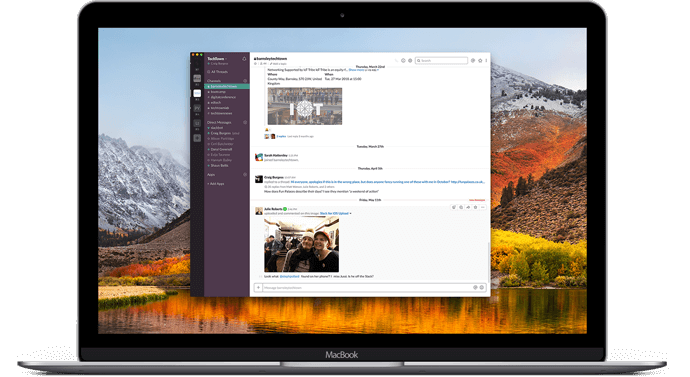Good Practice Description – Barnsley
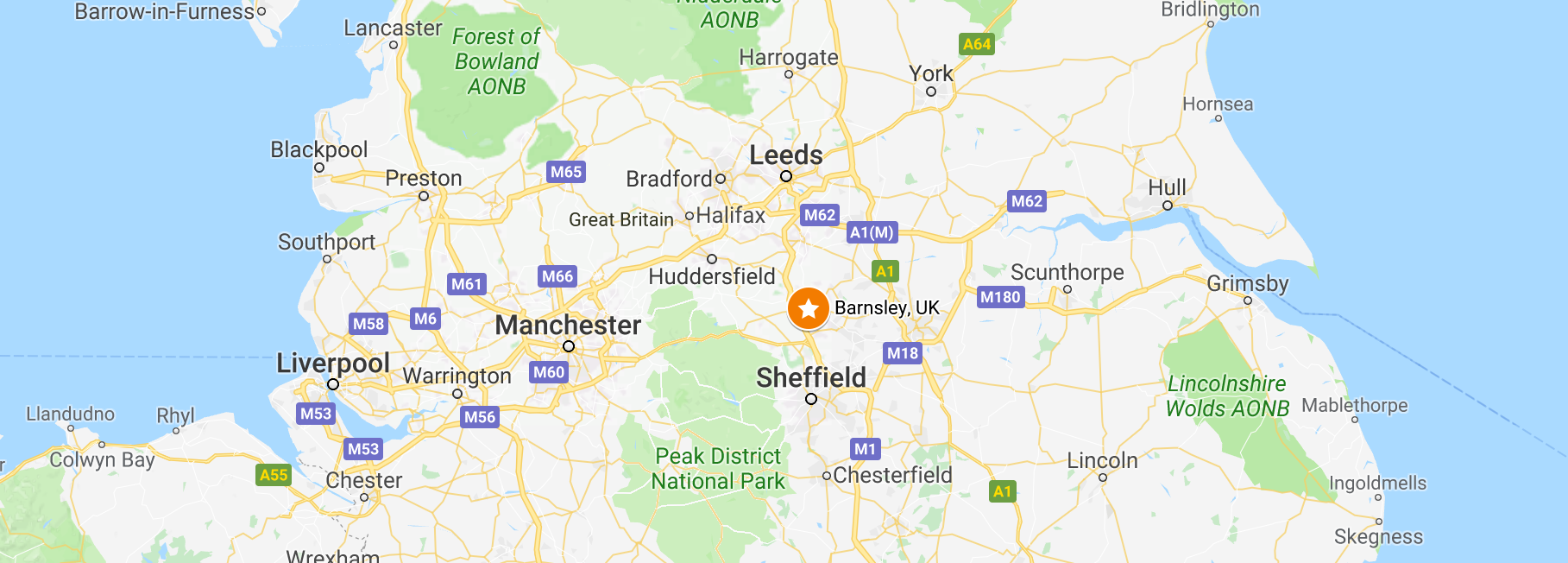
In the North of the UK directly between Sheffield and Leeds, Barnsley is a former mining town, seeking to diversify its economy. The population is 243,300 and the unemployment rate is 5.1%
About the City
- 99.5% of all companies are small and medium sized enterprises (SMEs)
- The largest employment sectors are public sector (21% and wholesale and retail trade (16.9%), Manufacturing (14% and transport and storage (6.5%)
- Private sector employment is increasing but there is still heavy reliance on the public sector for employment (21% of employment)
- Creative, tech and digital industries are seen as potentially transformational sectors and the city has a clear aim to grow more and higher value jobs for local people
About the policy context
The good practice will be transferred within the following policy contexts:
- At national level, the Good Practice links with the UK government’s concept of the ‘Northern Powerhouse’ which aims to support stronger growth in Northern cities. It also sits within the strategic goal of TechNation which is to position the UK as the global destination for ambitious tech entrepreneurs. TechNation stress that, to achieve this goal, it is important to make sure that the UK tech sector creates opportunities for all major towns and cities.
- At regional level, the Sheffield City Region Digital Action Plan sets out regional ambitions for a digital sector that can help drive growth across different industries.
- At local level, the good practice is closely linked to the More and Better Jobs plan and the TechTown Integrated Action Plan which sets out the ambitions to create a Digital Campus that will connect digital people, businesses and learning online and offline.
A description of the Good Practice
The jobs challenge
Growing more and better jobs and businesses is a key focus for many cities across Europe. Medium sized post-industrial cities in particular seek ways to grow and diversify local economies, needing to compete with the pull of larger hubs.
The good practice
Barnsley has been committed for over 10 years to growing higher value jobs, particularly within its creative, tech and digital sectors. The good practice comprises 2 main pillars:
- Enterprising Barnsley – a successful business support programme;
- The Digital Media Centre (DMC)- a landmark hub for creative and digital business in the town centre.
Through the success of these interlinked activities, the town has also been able to spin out a number of new initiatives and activities and it will be important to account for these in the transfer of good practice. For the purpose of the transfer network, the good practice is therefore defined as follows:
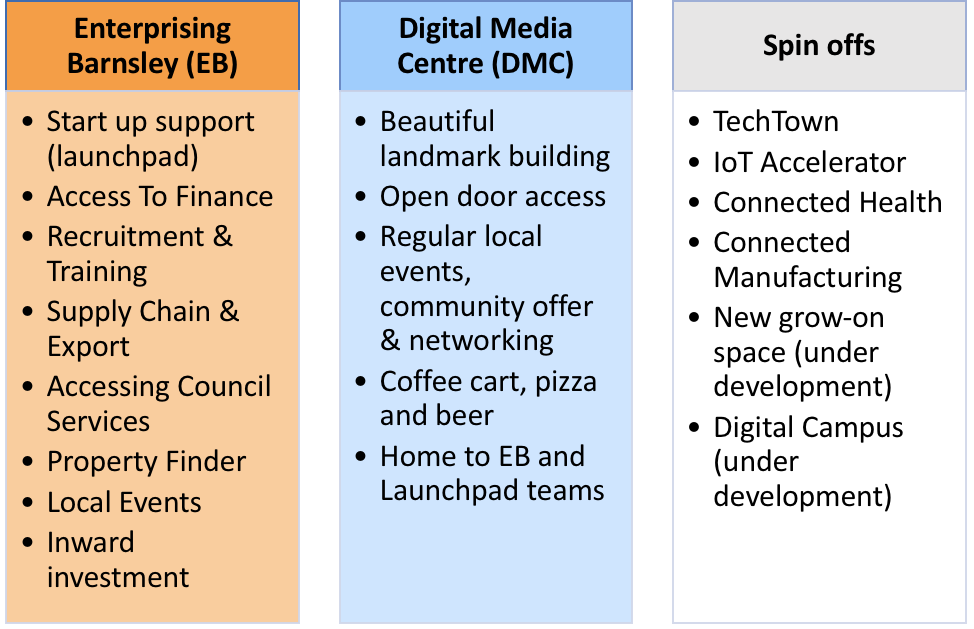
Enterprising Barnsley
Enterprising Barnsley is an initiative which, initially funded through ERDF and subsequently by the Council, has run in one shape or form since 2007. It provides an intensive and integrated package of intensive support focused on local (start up and established) business needs in order to create and accelerate economic growth. The portfolio of projects focuses upon business start-up support, business incubation, enterprise coaching, inward investment, networks and workshops and enterprise hubs.
It now creates around 1500 jobs per year and every £1 invested by Enterprising Barnsley helps to secure an additional £5.33 in private sector investment into the local economy; and, every £1 of investment secures an extra £0.96 in business rates for the Council.
“The support we receive from Enterprising Barnsley is fantastic. We have had assistance with recruitment, training and various council services which has had a positive impact on our business. As the largest private sector employer in Barnsley, with over 4,000 employees, we continue to look forward to enhancing site operations in the future and look forward to continuing our positive relationship with Enterprising Barnsley”. Ken Perritt, Account Director, XPO Logistics
Enterprising Barnsley is now a core council service which includes support with:
- Starting Up (Launchpad)
- Access to Finance
- Recruitment & Training
- Supply Chain & Export
- Accessing Council Services
- Property Finder
- Local Event
- Inward Investment
Each of these elements is described briefly below.
Startup Support (Launchpad)
Based at the Digital Media Centre (DMC) the Launchpad service provides a dedicated team who will support anyone in Barnsley who is looking to start a business, no matter what stage their idea or business is at.
The Barnsley Launchpad Service provides the following:
- A fixed central location (The DMC) in a dedicated enterprise hub
- A modular start-up workshop service covering all key topics, with modules split across various days/times allowing participants to access them at times to suit
- A dedicated area within the DMC (The Hub) allowing clients to study, access data and network
- A selection of workshops and events at various times covering key topics
- Clinics staffed by business advisors and key experts where clients can obtain one to one bespoke support
- Networking events to share experiences and obtain peer support
- Data available that provides answers to commonly asked questions with access to Business Planning tools and links to key websites and other important information
- The opportunity to inter-trade between clients
- Two full time employed Business Advisors to work with the companies on the programme and those that are in the early start stages
- Support for the first two years of trading with access to services to assist their growth and development
- The programme is delivered by 4 full time staff, supported by Associates and Mentors.
Access to Finance
Companies investing in Barnsley may be eligible for grants towards capital expenditure. Enterprising Barnsley helps companies to understand what is available and how to access it.
Since 2012 this has helped to generate over £8.8m in grant funding to enable businesses to expand into new premises and purchase new plant and machinery, helping to secure over £59.3m in private sector investment and create over 760 new jobs.
Recruitment & Training
The team includes an experienced Key Account Manager who helps companies to recruit and develop the skills required for their business.
This might include:
- Labour market information relating to wage rates and skills availability
- Analysis of recruitment needs and guidance on advertising options
- Links to local public-sector employment brokerage services provided by Job Centre Plus
- Guidance on traineeship and apprenticeship recruitment, local providers and funding
- Advice on work experience, work placements, internships and graduate recruitment
- Links with relevant contacts at local Schools, Colleges, Universities and Community Groups, local recruitment agencies or companies making redundancies
- Supporting large scale recruitment drives
- Connecting with sector-based work academies tailored to specific training requirements
- Access to up to 50% funding for investment in skills development
- Training needs analysis
- Signposting to local training providers, programmes and skills sectors
- Connections with vocational, accredited and bespoke training solutions for all levels of the workforce
- Free quarterly HR networking events to keep companies up to date with new developments, showcase best practice and facilitate introductions to other HR professionals and business owners.
Supply & Export
Enterprising Barnsley Business Development Managers can help companies to access the best possible advice and support available from DIT (Department of International Trade) which has its regional office based at the Digital Media Centre. They run a number of training and information programmes and can provide a range of support to businesses, including financial subsidies for companies participating in trade missions. They have a large team of individual specialists who have extensive experience in specific sectors of business and knowledge of geographical areas in various parts of the world.
Accessing Council Services
One of the important roles played by Enterprising Barnsley staff is to help companies navigate around the council’s own departments. This might be about planning, property, events or advice on business rates for example.
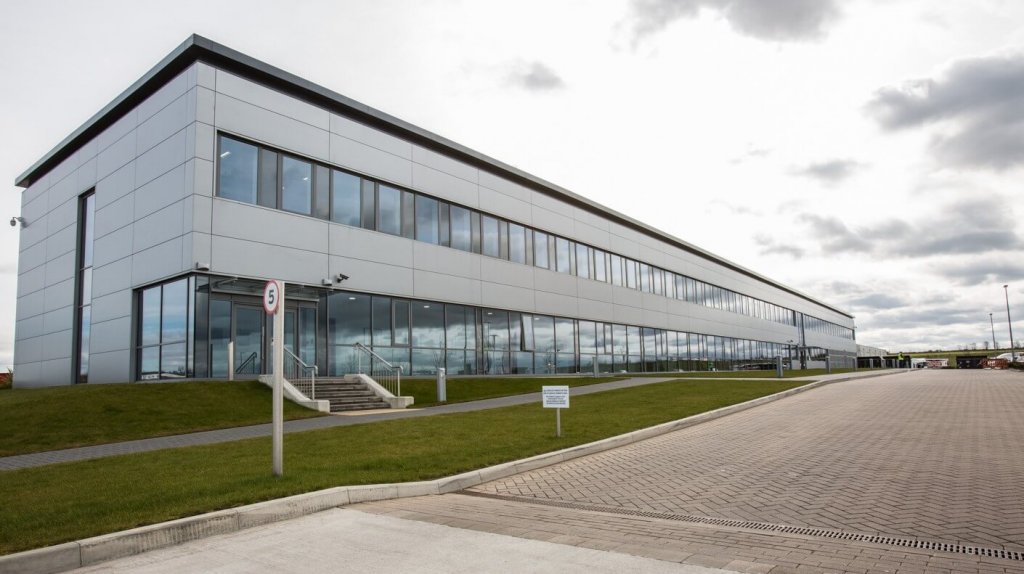
Property Finder
The EB teams helps companies to locate the right space for them – whether from within their own portfolio or outside. This includes access to a regularly updated and comprehensive commercial property database.
Inward Investment
Dedicated Inward Investment managers work closely with companies seeking to relocate, supporting them from enquiry through to recruitment. The team support companies to access the local Property Investment Fund where appropriate to help with new build projects.
Over the last 4 years this team has helped to attract over 120 companies, helping to secure over £62.3m of private sector investment and create over 665 new jobs.
Digital Media Centre
The Digital Media Centre (DMC) is a town centre hub of creative and digital businesses with Grade A office accommodation in a unique environment designed by Bauman Lyons architects. The Centre combines a range of meeting and conference spaces with flexible coworking and hot desk accommodation. Adjacent to the main transport interchange, it is easily accessible from Sheffield, Leeds and Huddersfield. The DMC itself is a BREEAM Excellent building, which was sensitively designed by architects as a landmark hub with environmental credentials.
The investment made into the DMC which opened in 2007 was significant (£12m), however, it has only been by carefully combining the physical infrastructure with fit for purpose support that it has seen genuine impact.
Initially a decision was made to use external innovation experts to manage the building and deliver the community offer. However, when after 7 years of variable performance, the centre was still only at 54% occupancy, a decision was made to bring the management back into the control of the council.
Three years later, the DMC is at, on average,95% occupancy, generates surplus income for the council, and is a recognised hub for incubation, acceleration and wider support activities that focus both on developing the sector, and also supporting the digitalisation of traditional industry.
Three years later, the DMC is at, on average,95% occupancy, generates surplus income for the council, and is a recognised hub for incubation, acceleration and wider support activities that focus both on developing the sector, and also supporting the digitalisation of traditional industry.
One of the key success factors is that the main physical asset of the DMC is connected with support programmes and activities, including the start-up support service which is co-located there. The DMC hosts regular networks and events and works hard to grow the digital and creative economy through clustering and community building, and also to drive demand for digital products, skills and services. It collides traditional and digital industry expertise. This wider community offer includes:
- Adopting an ‘open door’ policy: availability for any growing business, putting customers at the heart of the work;
- Making space available at no or low cost to those who want to deliver activities for other businesses, or digital sector events (e.g. hack days)
- Delivering a constantly evolving and varied programme of events, from casual meetups to networking and ‘dives’ into new tech, a monthly breakfast club and workshops for startups based on Lean Business Model Canvas;
- Using Slack as a digital platform to collaborate with digital community, generate feedback and ideas, as well as informal conversation;
- Free-to-access bespoke business support for growing companies;
Spins Offs
Through the success of Enterprising Barnsley and the Digital Media Centre, the council and its stakeholders have been able to develop a number of linked initiatives which form an important part of the context in which the good practice will be transferred.
These are:
- TechTown
- IoT Tribe North Accelerator
- Connected Healthcare
- Connected Manufacturing
- New grow-on space (under development)
- Digital Campus (under development)
TechTown
TechTown was an URBACT Action Planning Network, led by Barnsley, which ended in the Spring of 2018. It focused on what medium sized cities can do to create digital jobs, whether through entrepreneurship or digitalisation or disruption of existing industry.
The URBACT methodology, the TechTown Local Group and an intensive and fruitful transnational exchange programme has enabled Barnsley to structure some potentially difficult discussions with local and regional tech and digital stakeholders. Together they have co-created an Action Plan which was launched in June 2018. The action plan is intrinsically linked with the DMC. Positioning itself at the heart of a web of valuable connections locally, regionally and internationally makes the DMC and its projects more relevant and meaningful for the support of companies and people, as well as ensuring awareness of sector trends and developments.
The TechTown Action Plan [link] and its headline ‘Digital Campus’ action will help to continue to develop the sector and commits to a series of co-created actions around A Digital Place, Digital People, Digital Partnerships and Digital Businesses.
‘TechTown has put us at the top table in terms of moulding economic development and enterprise strategy at regional level’ Martin Beasley, Group Leader, Enterprising Barnsley.
IoT Tribe Accelerator
One of the many unexpected spin offs from a visit to Tallinn wth TechTown was the launch of an IoT start up Accelerator, based in Barnsley from January 2018. The learnings from Tallinn coupled with local pilot work around digitalisation of manufacturing evidenced the need and the feasibility for focused acceleration activity. Delivered by IoT Tribe North with funding from Innovate UK and sponsored by Rolls Royce this was a 12 week programme for Internet of Things startups.
The programme was run from the DMC and a total of 60 startups competed for the chance to take part in the programme, of which nine of the best were selected. The founders come from all around the globe, from Lincoln, UK to Bogotá in Colombia. They covered a wide range of fields including digital manufacturing, green tech, health and logistics. The tech entrepreneurs were given coaching in product development, market testing and investment readiness, joined trade missions to Dublin, Limerick (a connection from TechTown) and Singapore and finished by pitching to investors in London.
Outcomes included a pipeline of 13 pilots of which 5 were confirmed at the time of writing and substantial spin offs in terms of additional support from, and strengthened relationships with, some of the UK’s most important digital players such as Innovate UK, Digital Catapult and the University of Sheffield’s Advanced Manufacturing Research Centre. £75,000 of local authority funding generated over £800,000 of additional cash and investment into Barnsley and the work had clear added value in terms of brand profile and equity locally, regionally, nationally and internationally. Discussions are now underway about delivering another cohort in 2019.
“Having both the IoT Tribe North choose the Digital Media Centre and being able to leverage Rolls-Royce to get on board is a huge vote of confidence in the work we do here, helping digital startups to fulfil their potential through programmes and facilitating cross sector collaboration. Yorkshire and the north has a strong manufacturing heritage and an emerging digital specialism, making the Digital Media Centre the ideal place to bring these disciplines together.” Tracey Johnson, Manager at the DMC and Leader of TechRevolution.
Connected Healthcare
Connected Healthcare was an initiative run by Enterprising Barnsley in partnership with the Yorkshire & Humber Academic Health Science Network and Tech North. The programme comprised four events which supported digital health innovation through stimulating dialogue and collaboration between the creative, digital and healthcare sectors. In the Design Challenge, healthcare professionals and creative and digital businesses and tech entrepreneurs had the opportunity to work together to co-design new digital health solutions in response to unmet clinical and patient needs. Healthcare professionals learnt what digital approaches can bring to service improvement and patient care, and creative and digital teams found out about the healthcare market and new opportunities for their products and services. Through ‘Connected Healthcare: From Concept to Cash!’ participants were provided with tailored access to finance and business support information.
Connected Manufacturing
Barnsley DMC – Connected Manufacturing
In 2017 Barnsley piloted a Connected Manufacturing project in partnership with Digital Catapult which had the twin aims of supporting digitalisation within local manufacturers and supporting digital start ups to develop and commercialise new products and services. The idea was to bring these communities together in a win-win situation as set out below:
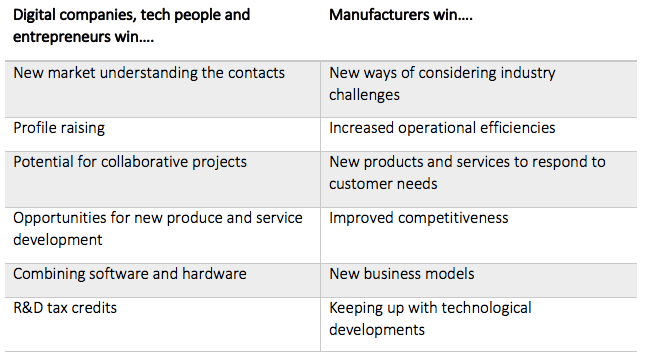
The work culminated in a major event bringing together manufacturers, digital start-ups and other stakeholders in May 2017. This explored:
- What does Industry 4.0 mean in practice?
- How can manufacturers really benefit and how can digital experts get involved?
- How manufacturers are using digital solutions to transform their production and quality processes and drive improvement through the supply chain e.g through use of data gathering and monitoring, data analytics, information management and reporting, connected devices and the Internet of Things and smart software solutions.
New grow-on space (under development)
With the DMC being at, on average 95% occupancy, Barnsley has been considering options for grow-on space nearby. In Spring 2018, a decision was taken to take ownership of a building across the road. This will provide up to 18000 sq ft of additional space subject to internal works. The initial plan is to blend workspace provision with a ‘Connected Lab’ environment that would co-locate data specialists, IoT Tribe activity and makerspace type facilities.. Whilst not part of the good practice, the evolution of this new space during phase 2 of TechRevolution could provide a useful context for discussions around physical infrastructure.
Digital Campus (under development)
Linked to the above, Barnsley has developed an ambitious integrated programme under a ‘Digital Campus’ Umbrella. Subject to resources, this aims to bring together digital people, learning and businesses across a connected campus of plans and spaces, both online and offline to deliver more and better jobs and businesses. Again, development and delivery will overlap with Phase 2 of TechRevolution and is of direct relevance to other cities.
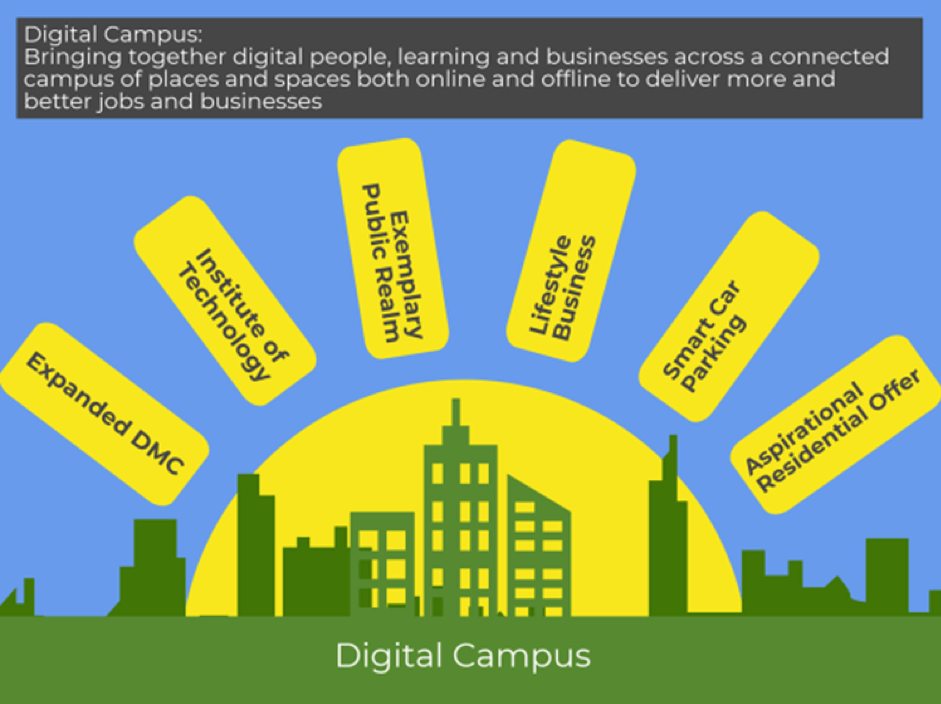
Key Achievements Of Enterprising Barnsley and Digital Media Centre
- Since 2010, Enterprising Barnsley has supported the creation of over 1000 jobs per year. This is a gross total across ERDF-funded programmes and direct investment by the council.
- Over the last 4 years this team has helped to attract over 120 companies, helping to secure over £62.3M of private sector investment and create over 665 new jobs.
- Since 2012, over £8.83m in grant Funding has been awarded to Barnsley based businesses helping them to expand into new premises and purchase new plant and machinery. This has helped to secure over £59.3m in private sector investment and create over 760 new jobs.
- The creative and digital economy has grown from 540 businesses to 679, as indicated by mapping reports commission in 2010 and 2015 respectively.
- The Digital Media Centre has seen an increase in occupancy from 54% in April 2015 to 98% at June 2018, with an approximately 25% increase in turnover.
- Digital companies in the DMC have grown in terms of job numbers, turnover and space rented. Highlights include a DMC company who forecast first year turnover of £90k/€105k and actually achieved £250k/€294.
- Projects run through the DMC have attracted a range of funding for delivery from public and private sector sources.
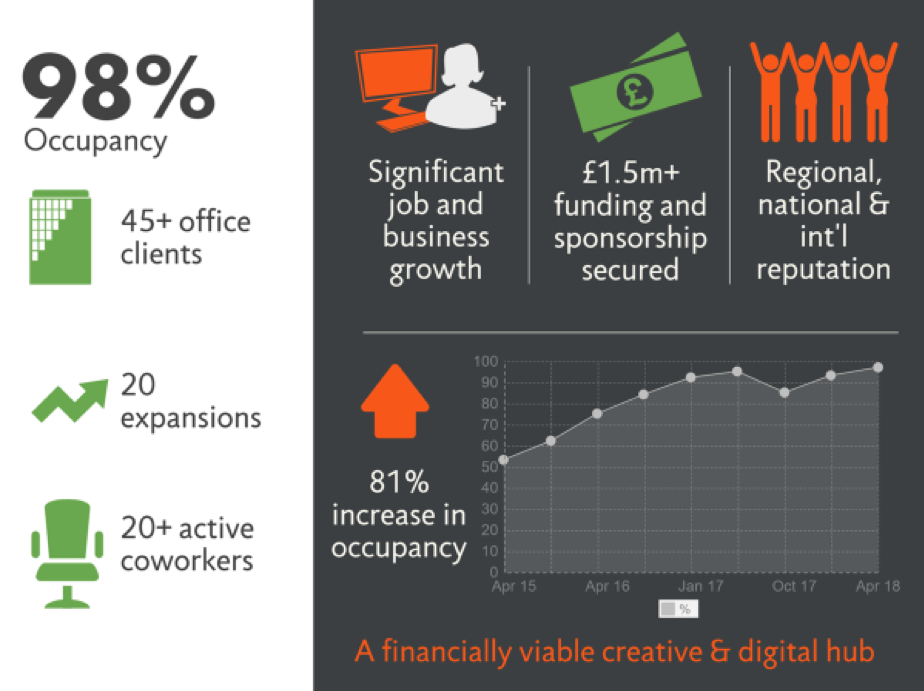
Success Factors
- When exploring transfer potential in phase 2 it will be important have a firm grasp of key success factors. Some of these which have emerged during the review of the good practice which has been done as part of phase 1 are listed here:
- The integrated DMC and Enterprising Barnsley model of growth support provides an adaptable blueprint that can be varied based on the local context of a city. The Enterprising Barnsley verticals of startup, growth, inward investment and business incubation are cut across by digital, and the DMC provides a focal point for this.
- It is important to take informed risks, to say yes and give permission to create and innovate.
- A committed and passionate champion or leader is essential. In Barnsley, Tracey Johnson has been an inspiration, leading by example, ‘walking the talk’, and supported by both immediate management, as well as senior officers and politicians. She has a firm understanding of what might work and what will probably not work, backed up with first hand industry and entrepreneurial experience and an unrivalled ability to visualise what might be possible. She never stops asking questions of others and has an ability to take an ambitious idea from conception to inception rapidly. She has extraordinary communication skills and a flexible and entrepreneurial working style and often goes the extra mile to respond to business needs. Linked to this Barnsley has demonstrated that trust won over time, and backed up with evidence of what works and where the gaps are, provides the backdrop against which informed risks can be taken and (some) failure accepted. The integration of project management, customer relationships and income generation into the DMC is built on several years of developing and delivering effective business support. This foundation of success is fundamental to being able to take risks, as the team is seen as trusted and capable.
- People are the key and it is hard to over state the importance of building networks, relationships and community evidence of what works and where the gaps are
- As evidenced by the length of this section, Barnsley have adopted an iterative and agile approach, continually learning from others both nationally and internationally and building over time.
- To grow a tech ecosystem, it is important to find the ‘geeks’ in every community. In Barnsley’s case they have worked really hard to help local people and businesses to see themselves in the ecosystem and taken every opportunity to build collaborative and meaningful relationships which even the most ‘unusual’ of suspects.
- A key element of the practice that will be relevant is the focus on digital, both as a sector and as the lifeblood of any and all businesses. The practice can help other cities identify and support their digital communities, provide places and places for connections and ensure all businesses benefit from new innovations, skills, services and tools.
- Within the DMC itself there has been a clear and useful plan to blend local start-ups with the supply chain. As evidenced by Julie who test traded her coffee cart at the DMC and is still there 2 years later, this creates a network of champions and gives local entrepreneurs a sense of pride, purpose and ownership
- Co locating the “soft” Enterprising Barnsley support with “hard” Digital Media Centre facilities presents Barnsley as a destination for business growth. This, coupled with clear evidence of an ability to collide digital experts with traditional businesses to drive innovation/disruption has also been a prerequisite of success.
- Despite being a medium sized town, Barnsley has made great efforts to be, and to stay, connected with the cutting edge of tech, and has established high-level networks to benefit clients (e.g. Rolls Royce, Capital Enterprise).
- Working with stakeholders has been a key element of the programme’s success. This approach was used to consider how best to integrate the DMC when direct management of the building was taken on. At that point the Barnsley Economic Partnership, a hyperlocal group of business leaders, contributed to planning, and remains a check and challenge group. More recently the TechTown ULG has provided a safe and trusted space for open discussion, evidence collection and action planning.
- Softer practices such as the ‘open door’ approach, coffee cart, pizza and beer events and ping-pong table with a lean, private sector mindset/methodology in teams are replicable, and are unusual to see working at city administration level.
Ongoing challenges
Perhaps not surprisingly with such a far-reaching set of practices, there remain some challenges. Some of these – such as the difficulties of being located in 2 city-regions and managing the two sets of relationships – are quite unique to Barnsley. Others are of relevance to other cities and include:
- There is a sense that education at all levels needs to be much more responsive and connected to the local economy.
- Linked to this, digital companies need skills and talent which is not always available locally, or even nationally. Growing high value jobs in a post-industrial and relatively traditional town like Barnsley is already difficult. Developing a better, and more diverse, talent pipeline will become increasingly important moving forward, especially as the UK exits the European Union ☹
- There are ongoing challenges in combining the need to operate quickly and be responsive to immediate needs with the speed at which ‘normal’ council business takes place. This is particularly evident when it comes to procuring services. Quite simply there is a complete mismatch between the speed and processes of public requirement and the need to be responsive to customer requirements.
Scope for Improvement – Always learning, always asking questions
- For Barnsley, there is still more work to do to fully address local ambitions of more digital jobs and businesses. There remains a local and regional deficit in this area and clearly Barnsley cannot stand still and expect to address this.
- Whilst there are clear areas of good practice, there are also areas where more development is needed so as to maximise ongoing impact and inform the roll out of the Digital Campus. These are seen to be:
- Barnsley, like many medium sized towns and cities, needs to develop a more sustainable pipeline of higher value, knowledge-based businesses. This is particularly challenging in a town with limited higher education or research capacity. It is therefore important to create an environment where start-ups can link to cutting edge academia and research. This might be through more proactive signposting and referrals and / or there may be options to develop more of a ‘hub and spoke’ model with some of the region’s more industry focused universities. It seems as if the University of Sheffield’s Advanced Manufacturing Research Centre would be a very natural starting point. Given the focus on industry 4.0. perhaps one option would be to co-develop a physical resource to bring together data and IoT specialists from public, private, corporate and higher education to work in a sandpit environment containing technology, tools and workspace. This could expand the current model and better connect the businesses and education providers already located in Barnsley with people interested in digital – so called makers and hackers perhaps, creative companies, and those interested in digital careers (at any age). It would also provide a focal point for corporate connections.
- Linked to this Barnsley has acknowledged a need for a pipeline of suitable talent. With the UK exiting the European Union it will be more important than ever to develop links internationally and to explore new and innovative ways of growing indigenous talent and business, as well as exploring talent attraction in the short term. A strong, and industry focused education offer will be vital long term and it may take a generation (or more) to meet the talent needs of industry 4.0. As well as hacking into the formal education, there is an opportunity to develop and deliver non-academic responses e.g. building on TechTown lab to deliver a programme to stimulate digital problem solving and design skills in young people.
- Underpinning the intended increase of higher-value and knowledge-based jobs and businesses will be a need for new models of finance. Barnsley is keen to explore this further, and to look at how businesses in partner cities access finance – whether debt, grant or equity led. This is particularly important when it comes to supporting businesses to scale and it will be useful to explore innovative and agile approaches. A co-investment model (such as the London Co Investment Fund) could also offer a sustainable solution with revolving funds being recycled back into the central investment pot.
- It will be important for Barnsley to continue to evolve its business support – and space – offer to ensure that they can support companies to start up and scale through a significant change period which will see a revolution in terms of automation, artificial intelligence and machine learning. Keeping ahead of the curve will be vital and relationships with other stakeholders in other cities will be vital as they provide a unique opportunity to build a robust, agile approach to supporting business growth.
- It may be useful in the near future to have an honest conversation in Barnsley about governance and delivery models. For example, as things stand any surplus revenue earned through the DMC is not automatically re-invested into economic development. There are also a few issues around the requirements of public procurement processes which could stifle ongoing innovation and evolution of the practice into a sustainable, entrepreneurial digital campus which continues to deliver more and better support and ultimately more and higher value jobs and businesses. It could be useful to use the exchanges which will take place through TechRevolution, coupled with URBACT tools, to stimulate this conversation. For example, are there different governance models within or outside the network which could usefully inform how the Digital Campus is structured?
Overall Transfer Potential
The good practice is multi-faceted and has evolved over a period of over 10 years. It is simply not possible to expect all of it to be transferred to another city as a whole package, let alone in a 2-year period. Much of the success is related to connections and relationships between ecosystem stakeholders – these are the roots from which different shoots have emerged over time. Growth cannot be accelerated.
With this in mind it will be important to look at the good practice as a package of inter-related elements and activities. Taken together they start to create an effective digital ecosystem. Transfer will work best at the level of these different elements as this will enable transfer partners to develop the in-depth understanding of success factors and lessons learnt that is a prerequisite of successful transfer. Transfer potential is explored in more detail both in the partner profiles and in Section 3 below.
Credits
Created with images by fancycrave1 – “laptop human hands keyboard typing working business” • Benjamin Child – “Elegant boardroom” • image4you – “euro coins currency” • Helloquence – “Brainstorming over paper” • blickpixel – “board electronics computer”

